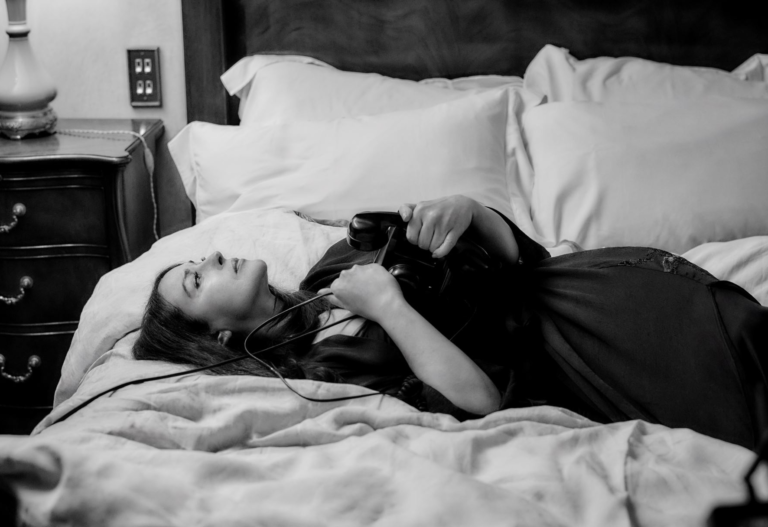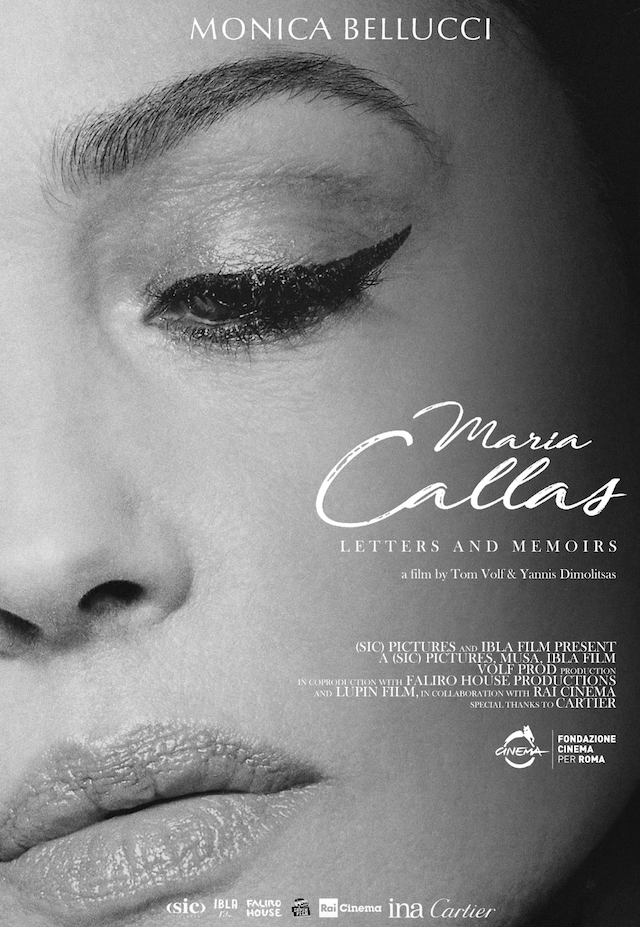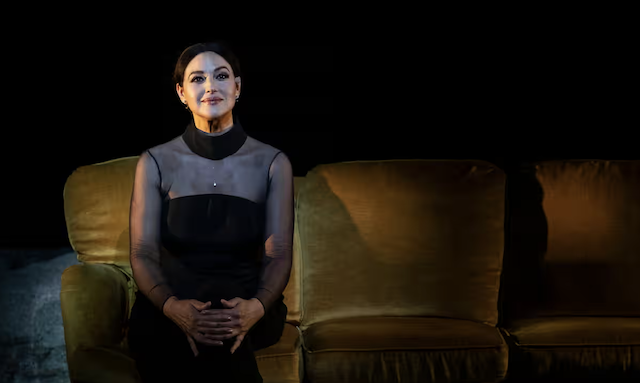
©Courtesy of (SIC)Pictures/ Ibla Films
On June 17th Monica Bellucci was in New York to present at MoMA the documentary Maria Callas: Letters and Memoirs. Directed by Yannis Dimolitsas and Tom Volf, it talks about the international tour of the stage play that Monica Bellucci performed between November 2019 and January 2023, ending at the Beacon Theater on the 100th anniversary of Maria Callas’ birth. A few days before the screening, we had a privilege to meet Monica Bellucci at the Baccarat Hotel, just next to MoMA.
Maria Callas: Letters and Memoirs : The world tour of the play Maria Callas: Letters and Memoirs, starring Monica Bellucci as the great opera diva. Through the chronicle of the tour, which lasted from November 2019 to January 2023, we observe and compare two different eras (the current one and the one in which Callas reached the apex of fame), while at the same time, we partake to and witness an essential dialogue between the great contemporary Italian actress and the voice that marked the 20th century: two women who, despite their different background, meet in retrospect due to their love of art.

©Courtesy of (SIC)Pictures/ Ibla Films
Interview with Actress/Producer Monica Bellucci
Q : For an actor, there’s usually a key or something that makes you think: “Okay, this is the way I want to portray this character.” What was the key for you about Maria Callas’ role?
Monica Bellucci : For me, it has been a very instinctive thing. When I read the letters and the memories, I felt such a strong emotion, it was a decision taken with my instinct. I knew the wonderful artist, but I felt the woman and the closeness with this sensitivity that spoke to me, this Mediterranean heart that I recognized immediately.
A woman who was also a great actress, because she was wonderful in Medea, the movie she made with Pier Paolo Pasolini. Beautiful and contemporary. This great actress, this great diva, is at the same time a woman with a simple heart that is full of sadness and pain. You have to be honest, you have to have a sincere heart to die of a heart attack.
This woman has touched me enormously, and even if I was afraid of acting on the stage, I couldn’t say no. Maria Callas gave me the strength to go beyond my limits. These letters and these memories gave me the desire, with my work, to transmit this feeling even if I did it at the tip of my toes, with humility, and passion. Theater has this strength, you are in direct contact with the audience, and they can feel your soul, your fears, and your vulnerability.
This very strong relationship lasted three years. It was an incredible coincidence that we ended up at the Beacon Theatre in New York last year because she was born in 1923. The emotion at the Beacon was great. It is an honor for us to present this documentary. to the MoMA. It traces these three years, we shot in the Callas’ apartment, on George Mandel Avenue: all the scenes on the phone, in bed, are scenes that we shot just to portray the loneliness, a solitude that she then treated with extreme elegance.
We are still here today to talk together about this woman precisely because I think she is still incredibly modern. She is one of the greatest sopranos of all time, but she is also a woman who dared to fight for her independence, she followed her heart and wanted to divorce when the divorce didn’t exist.
She had the strength to live her life following the emotion and the heart. This is her modernity. Women today have such a big social impact, they are less afraid to say things and express themselves more: this is why now have more female directors, more female scientists, and more female pilots. Maria instead was a pioneer of her time. For us, she represents an example as a woman, not only as an artist.
Q : Was there a side of Maria Callas that you weren’t aware of and it may have surprised you when you began studying the letters?
Monica Bellucci : Her ability to love. It was so great, so intense. In the end, she was unpredictable, she sacrificed her youth for work, and then when she met Onassis, for him she sacrificed all the work she had done up to that moment for love. She took all the risks that she felt she had to. She could not realize no longer exercising her voice, she was going to lose her voice.
When she came back on stage for the last time, after eight years of not singing. I see her as a woman of great falls and great achievements, she had great courage of choice and above all this strength to always follow his heart. The greatest pain in her life was having no family, and no children.
She said in some interviews this was her great pain. We understand well how children change your existence because you are not just you anymore. You are not in the center of your world. Especially a woman like her, who has always talked about the sadness of her childhood, about the difficult relationship with her mother and with her sister. For a woman like that, the love of her children is a great loss.

©Courtesy of (SIC)Pictures/ Ibla Films
Q : In the years you brought the play all around the world, was there a theater, a place, where you felt the pressure because of its history?
Monica Bellucci : I am still shocked by what I have experienced in these years. The affection, the warmth of the audience from everywhere, from London to Greece, from Istanbul to Spain, to New York. It’s been incredible. Different languages, and different cultures, and still the love I received was the same. Unbelievable. I hope I could share my emotions because what I received was something great.
It was my first time on stage and so many times the emotion stuck to my throat. In some theaters more than others, I had to make a huge effort to be able to give all this emotion that I felt. They say after a while the fear ends. It is not true: I have never once been on those stages, going quietly, until the last one, without being scared.
Until the Beacon Theatre, where we were welcomed, in a wonderful way. Same way for this screening we are going to have at the MoMA. Next day I will go to the Beacon Theatre to sign. I love that there you have all the signatures of all the artists. When I was there I was so full of emotion that I forgot to stop. So I’ll go next Sunday, I’m going to stop this time!
Q : The documentary ends with a letter from Maria Calls in which she says that in the end, her heritage to the audience is her music, her art. Which of your movies do you consider to be your heritage?
Monica Bellucci : I can’t answer precisely because, I think in every country I go to, different movies represent different things. In Italy, I feel it is Malena by Giuseppe Tornatore. In France, perhaps, the film that marked something important was Irreversible, a very violent film, but also poetic. Today it is a sort of cult movie.
In America, certainly Matrix, The Passion of Christ, all these films are a little emblematic. I’ve never lived in America, I’ve always come here to work and then go back home. My last one, Beetlejuice, Beetlejuice, I actually shot it in London. Before it Mafia Mamma, the movie from last year that I made with Toni Collette, I shot in Rome. I work a lot in Europe.
Q : This question means a lot to me because you worked with one of my favorite actors of all time, Gene Hackman. What do you remember of that experience?
Monica Bellucci : I consider Under Suspicion my true first American film. Before that, I had shot Bram Stoker’s Dracula by Francis Ford Coppola but it was just a cameo. Speaking about it, It makes me laugh to meet Winona Ryder again after so many years, right? So yes, it was just a cameo, but it made me understand that I wanted to do cinema. But my first American film, with an important role, was Under Suspicion.
It was an incredible experience for me to work with Gene Hackman and Morgan Freeman. And then, through this film, I went to the Cannes Film Festival for the first time, so it was another great emotion. I remember that it was a small film produced by Gene and Morgan themselves, for me it was the beginning of many things. In fact, while I was shooting the film in Puerto Rico, Giuseppe called me back to do Malena. Those are beautiful memories.
Q : How does an actor use period costumes, props, and makeup, in order to understand a character? What is the process?
Monica Bellucci : These are technical processes. From the inside, the desire to create starts. You try to have compatibility, a compassion for the character that you play. The costumes help a lot. Through them, you can enter the external skin of the character. That’s why cinema is so beautiful because it’s a common work, everyone needs everyone.
Every team manages a part of the film and together we do it. It’s like a big family, isn’t it? When you make a film, you feel protected, because you’re in this working group that lasts one, two, maybe three months. Even if you make mistakes it’s not a big deal, you can do it again. On stage, it’s not impossible. The tension is very, very high. It is a great feeling. When I was on stage, I was afraid that I would make some mistakes. An hour and a half alone, out there. It was such a special experience.
If you like the article, share your thoughts below!
Check out more of Adriano’s articles.
Here’s the trailer of Maria Callas: Letters and Memoirs

